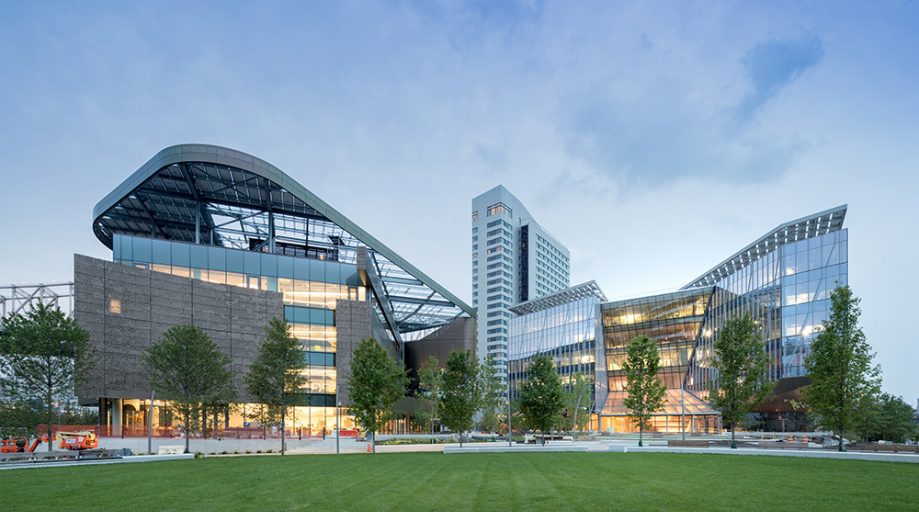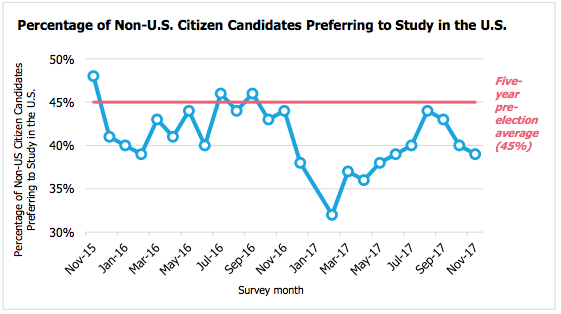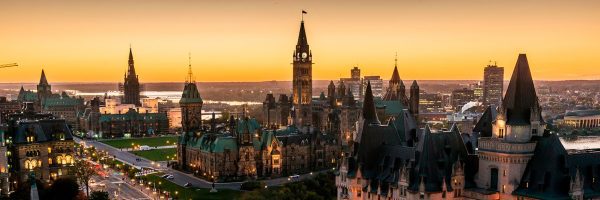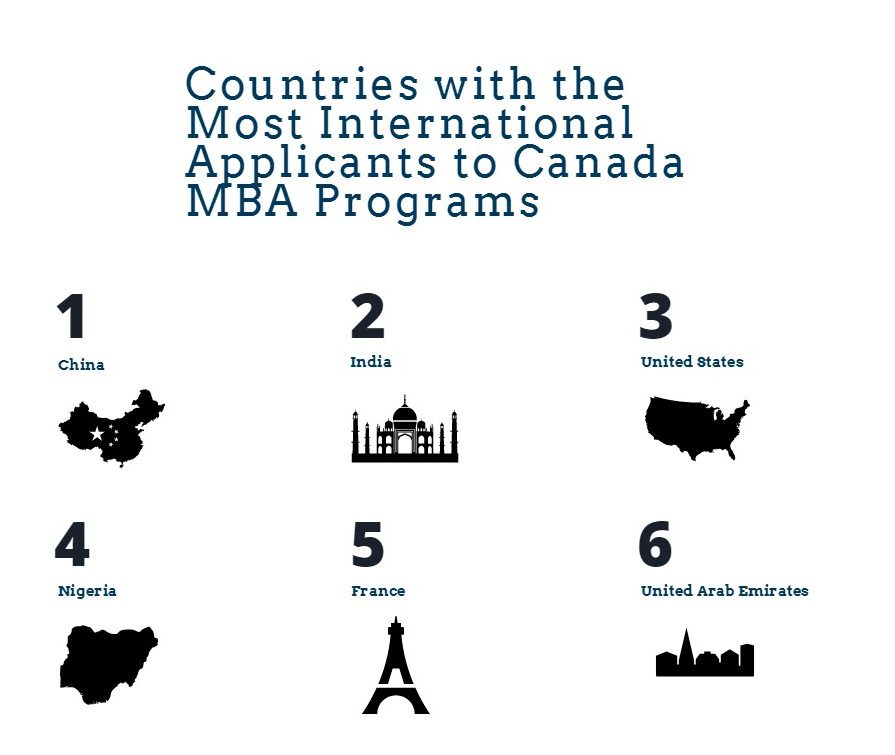Gear Up For These January MBA Deadlines

The next round of MBA admissions is swiftly approaching, with the eve of 2018 almost here. Time to mark those calendars!
New York City
The NYU Stern School of Business, Columbia Business School, and Rutgers Business School, Newark/New Brunswick are the big headliners when it comes to deadlines in the New York City metro in January.
The Forham University Gabelli School of Business, and the Syracuse University Whitman School of Management Online MBA program also have deadlines in the first weeks of the new year. Click here for more information on upcoming New York City metro deadlines.

The third round for application deadlines to Cornell’s Tech MBA on its new Roosevelt Island campus arrives January 10, 2018.
Los Angeles
The biggest Los Angeles metro business school institutions all have a slew of deadlines ready to pass within the first weeks of the new year, including the UCLA Anderson School of Management‘s full-time MBA, USC Marshall‘s part-time program, as well as the Claremont University Peter F. Drucker and Masatoshi Ito Graduate School of Management‘s part-time MBA.
Take a look at the coming deadlines in the Los Angeles metro here.
Toronto
Two Toronto metro schools have deadlines in early January, with the Ivey Business School full-time, Accelerated, and EMBA deadlines all falling on January 8, 2018. The second round deadline to the University of Toronto Rotman School of Management‘s full-time MBA also falls on January 8.
Take a look at the coming deadlines in the Toronto metro here.
Chicago
Two of the most prominent business schools in the entire Chicago metro—Chicago Booth and Northwestern Kellogg—feature a bevy of full-time, part-time, and Evening MBA deadlines before January 10. As well, the Quinlan School of Business at Loyola University’s full-time MBA for its annual spring intake arrives on January 15, 2018.
Just outside of the city, on the near border of Indiana, the Notre Dame Mendoza College of Business’ second round deadline for its full-time MBA program is set for January 9.
Get familiar with the coming deadlines in the Chicago metro here.

The second round of deadlines for the Northwestern Kellogg part-time and full-time MBA programs arrives on Jan. 10, 2018.
Boston
In Boston, the heart of America’s higher education, every January is a major month for several of the country’s most prominent MBA programs. Indeed, Harvard Business School and MIT Sloan, as well as the Questrom School of Business at Boston University, the Carroll School of Management at Boston College, and Northeastern University’s D’Amore-McKim School of Business all have MBA deadlines right at the beginning of the new year for various MBA programs.
Take a look at the coming deadlines in the Boston metro here.
For updated deadline information in Philadelphia, Washington DC, Baltimore, Atlanta, Dallas, Houston, Denver, San Francisco, San Diego, Seattle, and London, click here.
Are International MBAs Avoiding the United States?

Based on data from the most recently Graduate Management Admissions Council (GMAC) monthly survey, interest in U.S. business schools among international MBA candidates is still below pre-2016 election levels. In fact, it’s below the previous five-year average for each month since the election. And in each of the last three months—between September and November 2017—international application volume has decreased.

Image via GMAC report.
Just before Donald Trump’s election victory, approximately 46 percent of international MBA applicants surveyed by GMAC responded that they would prefer to study in the United States—above the 45-percent, five-year, pre-election average. But not once since November 2016 has that been the case. The percentage of international applicants indicating a preference for U.S. business schools plunged at the beginning of 2017, to below 40 percent in January and just over 30 percent in February. Summer 2017 saw a bit of a rebound—though never reaching 45 percent—but international interest has again declined this fall.
Of 1,992 non-U.S. candidates surveyed between September and November 2017, 23 percent shared that they had previously thought about applying to a U.S. program but have since changed their mind. As for the reasons behind applicant reluctance:
- 54 percent cited concerns about obtaining a job in the U.S. post-graduation
- 51 percent admitted concerns about gaining a student visa
- 47 percent cited safety and security concerns
- 42 percent talked about the political environment
- 39 percent admitted racism and discrimination fears
In addition, when GMAC surveyed nearly 700 U.S. MBA programs, about half admitted that they had received fewer international applications than in the previous year. Only 31 percent reported an increase in international applications. Another 20 percent reported no significant change.
For additional insights from GMAC as well as continued tracking of international candidate interest, visit the GMAC research website.
This article has been edited and republished with permissions from our sister site, Clear Admit.
Bloomberg Ranks Ted Rogers MBA Among World’s Best

Just a few weeks after Bloomberg Businessweek debuted its list of the top U.S. MBA programs for 2017, the publication revealed its ranking for the best international schools, with the Ted Rogers School of Management at Ryerson University being lauded as not only one of the best schools in Canada, but one of the best in the world.
The Bloomberg Businessweek ranking looks at factors such as the success rates of alumni in starting careers, starting wages, and surveys from recruiters, current students, and graduates of the program.
This marked the first time the Bloomberg Businessweek ranking has featured the Ted Rogers MBA, but the program’s success has not gone unnoticed, especially in Canada. The school is also regarded as one of the 100 best MBA programs in the world by The Economist and by the Canadian Business’ Top 10 Canadian MBA programs four years in a row. The program also placed in the top ten this year among the Bloomberg‘s ranking of top salaries and job placement for recent graduates.
Since its creation in 2006, the Ted Rogers MBA has been highly regarded for its innovative approach to business education and location at the center of Toronto’s business district. “From the beginning the Ted Rogers MBA benefitted from strong leadership, a commitment to excellence, and a focus on students’ careers,” Ted Rogers MBA Director Kim Bates said in a press release following the release of the annual ranking.
“As a startup program, we were able to configure our programs to reflect the new century and differentiate from our established competitors,” she adds. “Our career results are excellent, program delivery and commitment of faculty and staff are exceptional, and we have had support from our academic leadership to admit only high-quality students.”
French business school INSEAD led the way in this year’s ranking, taking over for the London Business School (LBS), which swapped the number one and two spots from last year. Ted Rogers, 24th overall, was one of five Canadian business schools to land on the list, with the Ivey Business School at Western University Canada earning the highest ranking among the group—11th overall.
Check out the entire 2017 Bloomberg Businessweek international MBA ranking here.
Ivey MBA Graduates Making Big Wins in the World of Hockey

MBA graduates from the Ivey Business School at Western University Canada, alongside other business alumni from the university, are making big wins in the world of sports.
From the intense academic experience inside Ivey classrooms to international study trips and strong alumni networks, graduates of Ivey’s many business programs, including their MBA degree, are changing the game for hockey in Canada and across the world.
Not every MBA’s success in hockey is even relegated to work off the ice. For Dave Barrett, MBA ’04 and PhD ’14, who helped coach the Western Mustangs Women’s hockey team to a championship title in 2015, there are many similarities between coaching players on the ice and priming students for business success.
“Shaping the environment that they work in and what they think about themselves is a lot of what we do here at Ivey,” Barrett comments. “It’s creating that culture—you bring good hockey players in and you have to shape them into a unified force. It’s the same here, too.”
Other major players from Ivey are finding ways to connect their love of business with a passion for hockey. Karin Adams, HBA ’06 and MBA ’14, has allowed her passion to lead her to a career in the Total Rewards department of the Maple Leaf Sports & Entertainment company. As Senior Director of the department, Adams is responsible for building a compelling employee value proposition for employees company-wide.
“As we continue to grow the breadth of our portfolio, it has different demands on the talent needs the organization has,” Adams says. “It changes where we need to be looking for talent and what we are doing in order to recruit and retain them.”
In addition to the MBA alumni, Ivey graduates of the HBA and MSc department can also be found making an impact in the world of hockey. Among them are John Chayka, the 28-year old General Manager of the Arizona Coyotes, HBA ’14, who was hailed as “one of the NHL’s 10 smartest off-ice hirings of the 2015 off-season,” and Dario Zulich, HBA ’86, who plans to use hockey to rebuild tourism and revitalize the community of Greater Sudbury.
Ted Rogers Dean Advocates Closing the Gender Gap by Engaging Men

Dr. Stephen Murphy, dean of the Ted Rogers School of Management at Ryerson University, recently shared his thoughts on the gender gap in business with The Globe and Mail, following a visit from Catalyst Canada.
In October, Tanya van Biesen, Executive Director of Catalyst Canada, recently visited the Ted Rogers School of Management to discuss gender inequality with current MBA students. Founded in 1962, Catalyst Canada has been working for more than fifty years to build welcoming workplaces for women by providing the necessary research, tools, and solutions to create leadership roles for women. “Gender inequality is not a women’s issue, it’s society’s issue,” van Biesen told Ryerson MBA students.
Dean Murphy agrees. “The gender gap is everyone’s problem,” he told The Globe and Mail, noting that only 68 of 142 countries increased their gender gap score throughout the past year, while 74 countries actually moved backwards. According to Murphy, a crucial part in reducing the gender gap lies in not just engaging women—but also men.
In Canada, women hold just 19 percent of S&P 500 board seats. Yet despite constant evidence revealing the benefits of gender and racial diversity in the workplace, 27 percent of directors in a recent survey (97 percent of whom were men) said there was an unnecessary amount of attention placed on gender diversity.
While many organizations and initiatives, such as HeForShe, exist to try to close this gap, dean Murphy emphasizes how important it is for men within a company to also see the importance of reducing the gender gap. At companies like PwC—which was able to increase the number of women in their global leadership team from 8 percent to 47 percent—training involves a discussion of the implicit biases that may lead to gender discrimination.
“Educating leaders on implicit and explicit bias is key to cracking the diversity nut,” Murphy said.
You can read the rest of his article in The Globe & Mail here.
Canada’s MBA Programs are Rising

The recent release of the GMAC 2017 Prospective Students Survey Report revealed some mixed revelations. While the status of smaller U.S. school MBA programs may be up in the air, international programs, particularly in Canada, are looking rosier than ever.
Overall, schools in Canada and Europe saw a 50 percent-plus increase in application volume from international candidates, of which GMAC speculates may be a result of political turmoil, particularly in the United States. This is a direct contrast from four years prior, in which less-than half of the Canada, UK, and other European business schools were seeing international applicant growth.
In the GMAC survey, an anonymous Canadian full-time MBA also noted, “The US presidential election has had a impact on our application numbers. Many international students choose Canada as their first choice.”
Niki da Silva, the Managing Director of the full-time MBA program at the Rotman School of Management at the University of Toronto, recently spoke with the Globe & Mail after the release of the report, saying, “This is our opportunity. We have to be anti-Canadian in this moment and really talk about what we are doing. We don’t tend to do that but we need to.”
By The Numbers
Results from the survey found subtle yet distinct differences between the international applicant pools in the major MBA location destinations.

In the United States, Europe, and Canada, according to GMAC, the two most prolific countries with international applicants were unilaterally India and China, which came in either first or second place for each region. However, for Canada, the remaining top 10 international countries with high applicant pools differed slightly from the U.S. and Europe, especially regarding Middle Eastern and North African countries. The United Arab Emirates (6th most), Tunisia (9th), and Iran (10th) were no where to be found in either the U.S. or European top ten.
Breaking the applicant pools down further, GMAC found an unsurprising correlation between the distribution of citizenship by application for Canada and the U.S. and the new data trends. After Europe, which had the most diverse applicant pool (a tricky stat since Europe is qualifying every country on the continent, while the U.S. and Canada are counted as singular entities), Canada had the world’s second biggest international pool of applicants, with less than 50 percent of Canadian business school students having official Canadian citizenship.
Domestic applications, in contrast, are actually down. But the international pool in Canada is swelling, creating substantial overall growth.
“International applicants comprised the vast majority of applications to business programs in Canada—64 percent of MBA applications and 88 percent of business master’s applications.” – GMAC
Gregg Schoenfeld, GMAC’s Director of Research, also noted upward trend for Canadian schools, saying, “This is the first time in the past five years that the majority, in fact three-quarters [of Canadian schools in the survey], are saying they are growing international volumes.”
“From a speculative point of view, it seems that the U.S. political climate has essentially driven candidates to Canada,” he continued.
YOU MIGHT ALSO LIKE: The Highest Starting Salaries for Toronto MBA Grads
The move to enroll more international applicants in Canadian schools started to emerge several years ago. Following lower periods of domestic enrollment, Canada’s MBA programs made a concerted effort to bring in more talent from abroad, creating a multi-year spring in growth that has not only benefited school enrollment, but fostered a positive international environment.
According to Global Affairs Canada, the result has been a positive economic boon as well. Upwards of 90,000 new jobs were created for Canadians just two years prior, while adding $10 billion to the country’s economy.
Tim Daus, Executive Director of the Canadian Federation of Business School Deans, previously noted that the trend was partly made possible because of the country’s flexible immigration policies, saying, “Canada’s visa requirements are much more flexible than other countries’, which gives us an edge. That makes a big difference for students who want to stay and work afterwards.”
Canadian Accolades
The substantial growth Canadian business schools have seen may not solely be the result of political overtones, rather, that many of the country’s best institutions only continue to improve.
The Schulich School of Business at York University in Toronto earned some hefty recognition from Forbes‘ recently released “Best Business Schools” global rankings, earning the 8th spot among the best international two-year program in the world. Schulich grads, Forbes claims, can expect a five-year net gain of over $48,000.
Last year’s Bloomberg BusinessWeek ranking of the best non-U.S. business schools also recognized both the Ivey Business School at Western Canada University and the Rotman School of Management among the top 25 programs in the world. Both the aforementioned Ivey and Rotman programs were recognized among the world’s 100 best by the Financial Times this year as well.
